Insights
Sprott Insights offers unique analyses and perspectives from the firm’s leading experts on key topics in precious metals and critical materials.
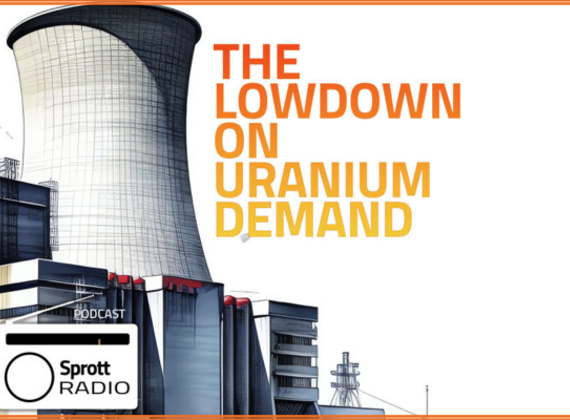
Sprott Radio Podcast
The Lowdown on Uranium Demand
Justin Huhn, founder of Uranium Insider, joins host Ed Coyne for a deep analysis of the uranium fuel supply chain and the challenges to satisfy expanding demand. "This year alone, demand is around 200 million pounds and supply is about 160 million pounds. That means we're about 40 million pounds short."

Sprott Radio Podcast
Battery Materials Deep Dive
Daisy Jennings-Gray from Benchmark Minerals Intelligence joins host Ed Coyne for a deep dive into today’s battery metals markets.

Interview
The Energy Transition to Uranium and Battery Metals
Ed Coyne, Senior Managing Partner, sits down with Gillian Kemmerer of Asset TV to discuss the energy transition to uranium and other battery metals, and what investors should take into consideration in this space. He also shares Sprott's outlook on gold.
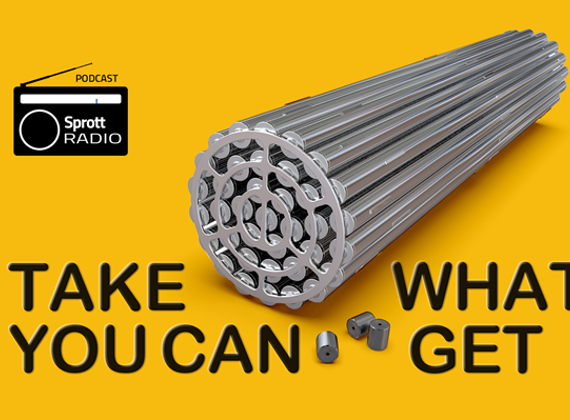
Sprott Radio Podcast
Take What You Can Get
With demand for nuclear fuel growing and supply facing challenges, the prevailing sentiment at the recent World Nuclear Symposium in London was “take what you can get.” Just back from the event, John Ciampaglia and Per Jander join host Ed Coyne to update us on the full story.

Sprott Webcast Replay
The Great Power Shift: Uranium, Battery Metals and the Energy Transition
The clean energy transition and worldwide energy security goals are fueling a global power shift. This shift has reignited interest in nuclear power, accelerated electric vehicle (EV) adoption and spurred renewable energy deployment. In this environment, uranium, lithium, copper and other high-demand, short-supply critical minerals are vitally crucial — and potentially attractive as investment opportunities.
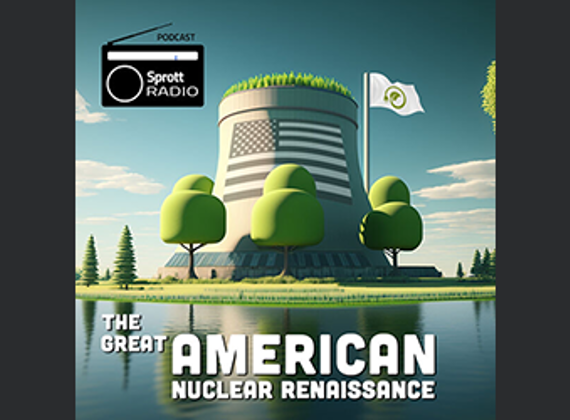
Sprott Radio Podcast
The Great American Nuclear Renaissance
With the introduction of the Inflation Reduction Act, US policy makers have reset the landscape for nuclear energy. Ed is joined by Benton Arnett from the Nuclear Energy Institute to walk us through the details.

Sprott Radio Podcast
Where Will the Gigafactory Feedstock Come From?
Joe Lowry, aka Mr. Lithium, joins Ed Coyne to walk us through all things lithium, including where ”Elon's first principle's rhetoric falls off the side of the table”.

Sprott Radio Podcast
Uranium Update from Per's Cabin
Just back from the World Nuclear Fuel Market 49th Annual Meeting, Per Jander joins Ed Coyne for an update on uranium markets. The theme was “Mind the Gap”, not a nod to the London Underground but rather the pressing need for increased uranium production as countries ramp up nuclear power capacity.
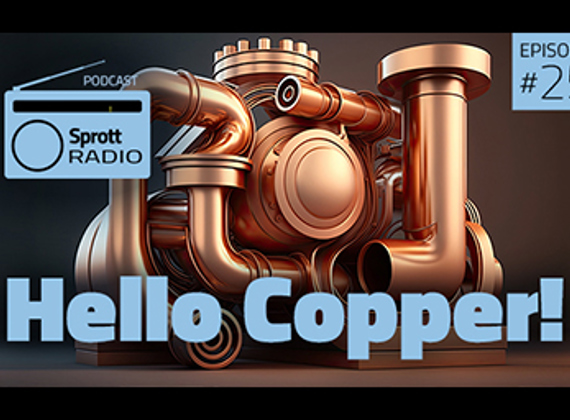
Sprott Radio Podcast
Hello Copper!
Host Ed Coyne and Nick Pickens from Wood Mackenzie discuss the bullish outlook for copper in 2023. Copper is key to electrical power generation and transmission, and sits at the center of the energy trilemma: the challenge of balancing cost, sustainability and security of supply.
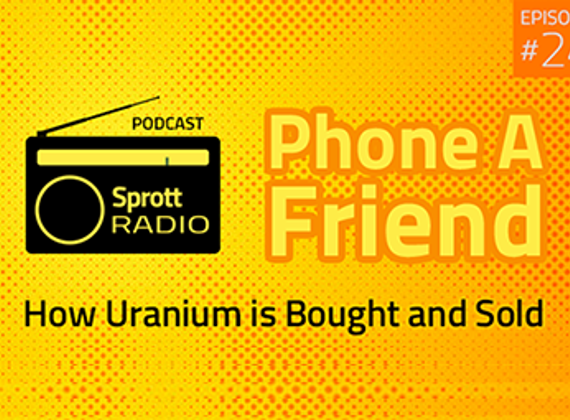
Sprott Radio Podcast
Phone A Friend - How Uranium is Bought and Sold
Treva Klingbiel of TradeTech and Per Jander at WMC Energy join Sprott's Ed Coyne to discuss the inner workings of uranium pricing and contracts, the future of nuclear energy generation capacity and the development of SMRs.

Sprott Webcast Replay
The Energy Transition Is Here. Is Your Portfolio Ready?
As the world sets aggressive goals to reduce reliance on fossil fuels and move to cleaner energy sources, critical minerals will be essential. Due to years of underinvestment, we believe demand is likely to outstrip supply for many energy transition materials, including uranium, lithium, copper, nickel and others. The investment opportunities may be powerful.

Interview
Fireside Chat: Investing in the Critical Minerals Driving the Energy Transition
A global clean energy transition is underway. Significant investment in energy infrastructure will be required over the coming decades as we evolve how we generate, transmit and store energy. Critical minerals will be essential. We believe investing in the mining companies that produce critical minerals may offer attractive investment opportunities, as discussed in this video with Ed Coyne, Senior Managing Director at Sprott, and Steven Schoffstall, Director ETF Product Management.
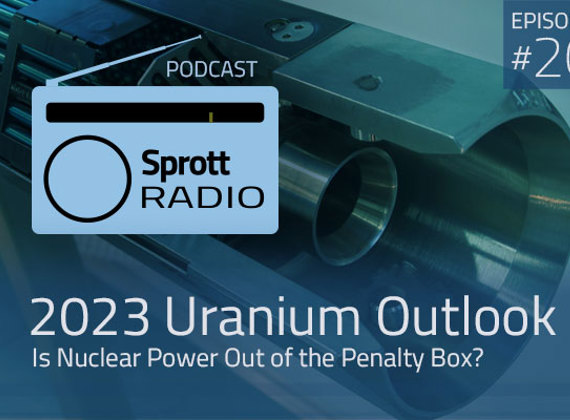
Sprott Radio Podcast
2023 Uranium Outlook: Is Nuclear Power Out of the Penalty Box?
Per Jander of WMC Energy and John Ciampaglia, CEO of Sprott Asset Management talk with Sprott’s Ed Coyne about what may be ahead for uranium in 2023, the resurgence in nuclear power interest as energy security concerns become top of mind, and what’s happening in uranium conversion and enrichment.
Important Disclosures
An investor should consider the investment objectives, risks, charges and expenses of each fund carefully before investing. To obtain a fund’s Prospectus, which contains this and other information, contact your financial professional, call 1.888.622.1813 or visit SprottETFs.com. Read the Prospectus carefully before investing.
Exchange Traded Funds (ETFs) are considered to have continuous liquidity because they allow for an individual to trade throughout the day, which may indicate higher transaction costs and result in higher taxes when fund shares are held in a taxable account.
Diversification does not protect against loss. The funds are non-diversified and can invest a greater portion of assets in securities of individual issuers, particularly those in the natural resources and/or precious metals industry, which may experience greater price volatility. Relative to other sectors, natural resources and precious metals investments have higher headline risk and are more sensitive to changes in economic data, political or regulatory events, and underlying commodity price fluctuations. Risks related to extraction, storage and liquidity should also be considered.
Shares are not individually redeemable. Investors buy and sell shares of the funds on a secondary market. Only “authorized participants” may trade directly with the fund, typically in blocks of 10,000 shares.
The Sprott Active Metals & Miners ETF is new and has limited operating history.
Sprott Asset Management USA, Inc. is the Investment Adviser to the Sprott ETFs. ALPS Distributors, Inc. is the Distributor for the Sprott ETFs and is a registered broker-dealer and FINRA Member. ALPS Distributors, Inc. is not affiliated with Sprott Asset Management USA, Inc.
